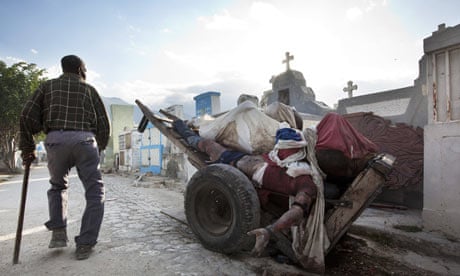The United Nations secretary general, Ban Ki-moon, today described the situation in Haiti as "one of the worst humanitarian crises in decades", as the Foreign Office confirmed that a British national had been killed in the earthquake.
"The damage, destruction, loss of life is just overwhelming," Ban said shortly before arriving in Port-au-Prince.
The Foreign Office said Frederick Wooldridge, a senior political affairs and planning officer for the UN, had died in the disaster. The 41-year-old from Kent studied at the London School of Oriental and African Studies before working for the UN in Geneva and Liberia, moving to Haiti in 2007.
"Frederick was a much-loved member of a close family. He leaves behind his wife, his parents, brother and sister, grandmother and extended family. He had many friends in the UN and beyond, particularly Geneva where he loved skiing and mountaineering," his family said in a statement.
There was still no news of a second missing Briton, Ann Barnes, who was believed to have been in the UN building when it collapsed.
Amid continuing concerns about security in Haiti, police shot and killed one man who was attempting to take market produce, according to the news agency AFP.
Residents awoke to find the bodies of thieves lynched by mobs or shot by men claiming to be plainclothes police. A Reuters journalist said he saw the burned body of a man locals said had been set ablaze by angry residents who caught him stealing, and two young men lying on the ground with bullet wounds to the head and arms tied behind their backs.
"Haitians are partly taking things into their own hands. There are no jails, the criminals are running free, there are no authorities controlling this," said Eddy Toussaint, a teacher standing in a crowd staring at the bodies.
A team of British rescue workers pulled a mother alive from the rubble of her house last night, 96 hours after she was trapped by Tuesday's earthquake. Volunteer group Rapid UK, supported by firefighters from Manchester and Leicestershire, freed the 39-year-old after she was trapped in a tiny space when her home collapsed.
"It was brilliant," said Anthony Thompson, a decorator from Bovey Tracey, in Devon. "This is what we train so hard for."
The rescue workers learned of the woman's plight when her neighbours said they could still hear her talking. The team dug a hole above her head with hammers and picks and found her lying beside her dead daughter, still holding her child in her arms. The woman was taken to a field hospital at the airport.
British rescuers were travelling to Léogane, a town of up to 100,000 inhabitants 40 miles west of the capital. They are thought to be the first rescuers to arrive in the town where around 80-90% of the buildings are reported damaged, according to a joint assessment from UN Disaster Assessment and Coordination, the European Union and the World Food Programme.
About 1,000 rescue workers in 100 teams are fanned out across Port-au-Prince working on selected collapsed buildings. On Friday, 35 people were pulled out alive and on Thursday, 25 survivors were found.
The initial response had been painfully slow as teams were turned back at Port-au-Prince airport due to chaotic air traffic control. Heavy lifting gear to penetrate buildings took even longer to arrive; in the case of the British firefighters it came on Saturday night, five days after the disaster struck.
Four US ships carrying desalination equipment capable of producing up to 25,000 litres of water a day will not arrive for several days. The USS Carl Vinson, an aircraft carrier already at the scene, can produce 35,000 litres a day. But the problem is how to get the water to survivors.
Stephanie Bunker, of the UN's Office for the Co-ordination of Humanitarian Affairs in New York, said: "Some bottled water is en route but it is a very small amount. There has also been some distribution of purification tablets. Water is water. You can't last long without it."
The Disaster Emergencies Committee said Concern Worldwide aid workers were distributing 2,000 jerry cans and 100,000 water purification tablets today. Save the Children gave water, food and hygiene supplies to 2,000 people at a hospital yesterday, while 1,000 families received water and clothing kits from World Vision.
A British Red Cross convoy bringing emergency response equipment and medical supplies reached Haiti by road from the Dominican Republic, bypassing the devastated airport and port.
There were further complaints about how some aid agency planes were not being allowed to land despite guarantees from the US and UN. "A cargo plane carrying an inflatable surgical hospital was blocked from landing in Port-au-Prince on Saturday, and was re-routed to Samana, in Dominican Republic. All material from the cargo is now being sent by truck from Samana, but this has added a 24-hour delay for the arrival of the hospital," said a Médecins sans Frontières spokeswoman.
Trucks piled with corpses have been carrying bodies to mass graves outside the city. Thousands of bodies are believed to be still buried beneath rubble. Hundreds of thousands of Haitians are living under homemade tents of plastic sheets, with no evident supplies of food.
The latest estimates for the death toll would make it one of the 10 deadliest earthquakes in history.

